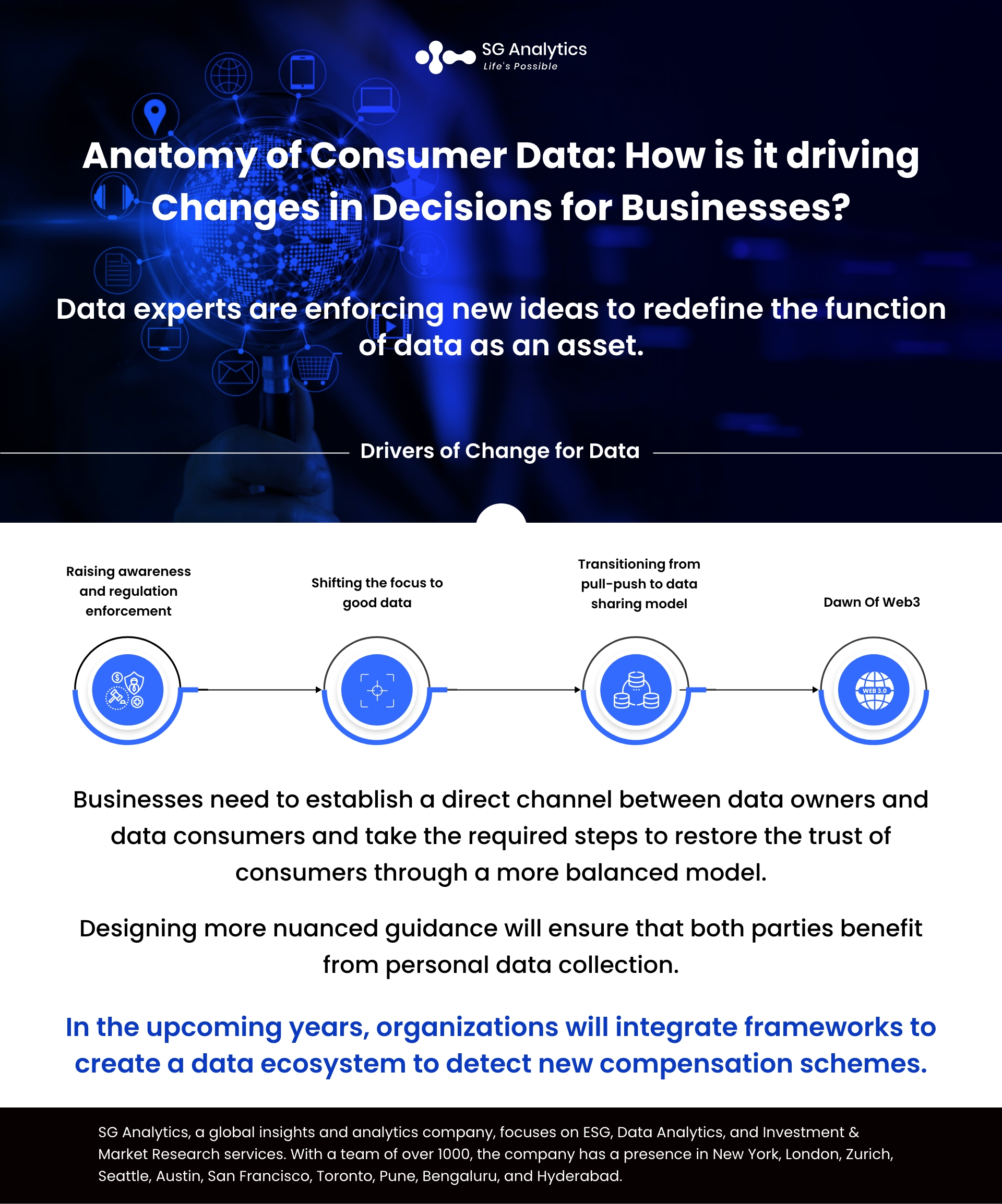For years, tech organizations have been ingraining their dominance by abusing consumers’ data as their main asset. Data experts are now enforcing a new vision to redefine the significance of data as an asset.
Today, the consumer is dissatisfied with this status quo of data collection. They are seeking means to incorporate measures on how their personal data is collected and shared. With consumers becoming more careful about sharing their data, regulators are stepping up privacy requirements, and businesses understand how data privacy can create a business advantage.
While some tech businesses are starting to feel the pressure and are responding with secure frameworks, they still need to incorporate actions to satisfy consumers. Businesses need to establish a direct channel between data owners and data consumers and take the required steps to restore the trust of consumers through a more balanced model.
Consumer data is transforming business, and organizations are responsible for managing the data they accumulate. McKinsey even conducted a survey to identify what consumers think about privacy and data collection. The research offered views of users on data collection and security breaches. They also voiced their opinions on data regulations and communications and also pointed out concerns in the businesses they patronize.
Read more: Data & Analytics Strategy: Must-Have Crucial Elements for Decision Making
With consumers increasingly adopting digital technology, the data being generated is creating an opportunity for enterprises to enhance consumer engagement but also building the pressure to keep consumer data safe. These data, which include location tracking and other personally identifiable information, are of immense value to companies. Many organizations integrate this data to gain insights into consumers’ pain points as well as needs. These insights enable them to develop new products and services along with personalized advertising and marketing.
The Need to Deliver Valuable Data
Today raw data populated on multiple platforms has the least value. The value of data increases only when consumers aggregate their own data. The values can further increase once it is validated and enriched. However, the true value of data comes from the patterns derived from it. The more the accumulated data is updated and insights are added, the more economic value the data will gain. It is vital for organizations to understand how much data is worth to the consumers so that they can offer commensurate value in return. Making the exchange transparent will help in building trust.

A lot depends on the type of data and how an organization is making use of the data. Personal data can be categorized based on three parameters:
- self-reported data that people volunteer about themselves, like e-mail addresses and work or educational history.
- digital exhaust, which includes data related to location and browsing history
- profiling data, or personal profiles employed to make predictions about individuals’ interests or behaviors.
Personal data is a type of data that populates a platform without keeping a copy. And taking ownership of data starts with consumers aggregating the data they have been left behind on various platforms. Many tech enterprises and platforms are developing APIs to ease the reclamation of personal data. Regulators also need to define rules around the right to access data. New data regulations will provide the right for individuals to own their data and reclaim the data, partially making it a significant asset.
Read more: Data Fabric and Architecture: Decoding the Cloud Data Management Essentials

Drivers of Change for Data
-
Raising Awareness and Regulation Enforcement
With increasing awareness about personal-owned data values and organizations implementing string data protection policies, third-party data is losing its credibility. However, regulations are becoming even more effective, as data privacy fines are being capped at only 4% of big-tech global revenues.
-
Shifting the Focus to Good Data
Big data may contain meaningless or contaminated information that can force businesses to rely on weak insights. However, it is costly to structure as well as analyze the accumulated data sets to generate actionable insights. Good data helps in discovering genuine data shared by the owner. With the market now hunting for cost-effective and quality data, personal-owned data will receive its long-overdue value.
-
Transitioning from Pull-Push to Data Sharing Model
Many organizations today promote zero-party data to solve the trust crisis that often arises with customers. While the end-user has the right to opt-out, this technique is often used as a smokescreen to make users feel that their data privacy is authoritative. And with personal-owned data becoming possible, it can be expected that the data-sharing model will transition from a pull to a push model, thereby enabling users to share their insights voluntarily to create a more democratized data model.

-
Dawn Of Web3
As we are on the edge of entering into the Web3 age, organizations are informing new operational frameworks to gain better control over how data is gathered and processed. Web3 will likely enable organizations as well as users to customize their personal data preferences with universal and specific settings. Blockchain will also be instrumental in ascertaining the authenticity of data ownership.
Read more: Top Data Science Trends to Look Forward in 2023
The Expanding Scope of Data within Organizations
The internet’s personal data collectors include websites and applications. By tracking users’ activities, marketers are able to deliver targeted advertising for businesses. Integrating intelligent technology in physical products enables companies across many industries to collect new types of information, such as users’ locations as well as behavior. This data personalization, such as adaptation to users’ preferences, is now becoming central to the product experience.
New data streams are making it possible for businesses to tackle complex challenges in fields including health care, environmental protection, and urban planning. With healthcare startups introducing digital transformation to the industry, healthcare providers can better tend to the patients, thereby facilitating preemptive treatments. The car service Uber recently agreed to share its ride-pattern data with Boston officials so that the city can enhance transportation planning as well as prioritize road maintenance.

Countless applications are boosting the power of personal data. But at the same time, this flood of data is also presenting opportunities for abuse, thus increasing data thefts. Large-scale security breaches expose consumers’ data to malicious agents. And these revelations of companies’ covert activities are making consumers more nervous.
To resolve this tension, companies and policymakers should move to data privacy discussion beyond advertising. They should start integrating the notion that aggressive data accumulation is bad. Designing more nuanced guidance, one that aligns with the interests of companies and their customers, will ensure that both businesses, as well as consumers will benefit from personal data collection.
Read more: Trends in Big Data Analytics: Forecast for 2023

Conclusion
There is much to be expected in data democratization for the fair distribution of personal data. In the upcoming years, organizations will integrate frameworks to create a data ecosystem to detect new compensation schemes in the form of data cooperatives. Individual data empowerment will imply shifting operations from a model granting permissions to consumers, thereby offering a range of control and the ability to set the data on its own terms.
The $500 billion digital ad market is expected to reach almost $1 trillion by the year 2026. It will be interesting to witness how the situation will transition into the hands of the data owners.
Corporations first need to understand that the data-sharing model is changing, and they need to establish new ecosystems. They need to define and differentiate what their good data requirements are from a business perspective and how to reconcile them to establish a balanced model. It is time for businesses to show evidence of respect toward data privacy and maintain a clear privacy statement that highlights their ethical commitment to how data is treated.
With a presence in New York, San Francisco, Austin, Seattle, Toronto, London, Zurich, Pune, Bengaluru, and Hyderabad, SG Analytics, a pioneer in Research and Analytics, offers tailor-made services to enterprises worldwide.
A leader in Data Analytics, SG Analytics focuses on leveraging data management & analytics and data science to help businesses discover new insights and build strategies for business growth. Contact us today if you are looking to make critical data-driven decisions to prompt accelerated growth and breakthrough performance.

